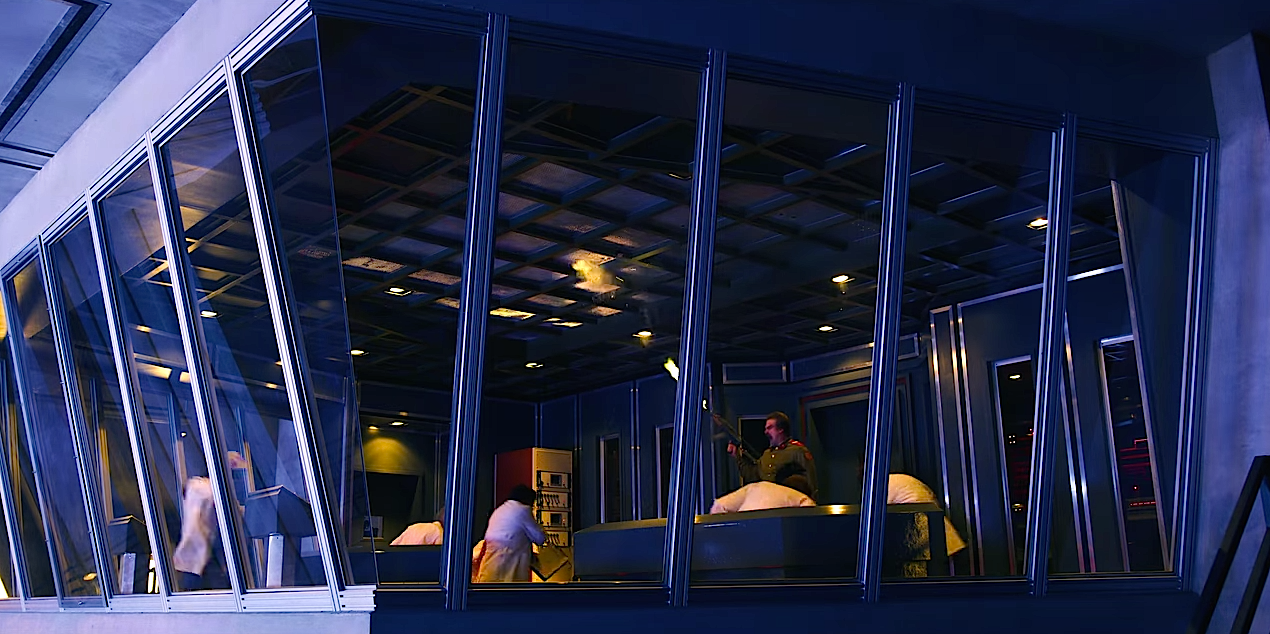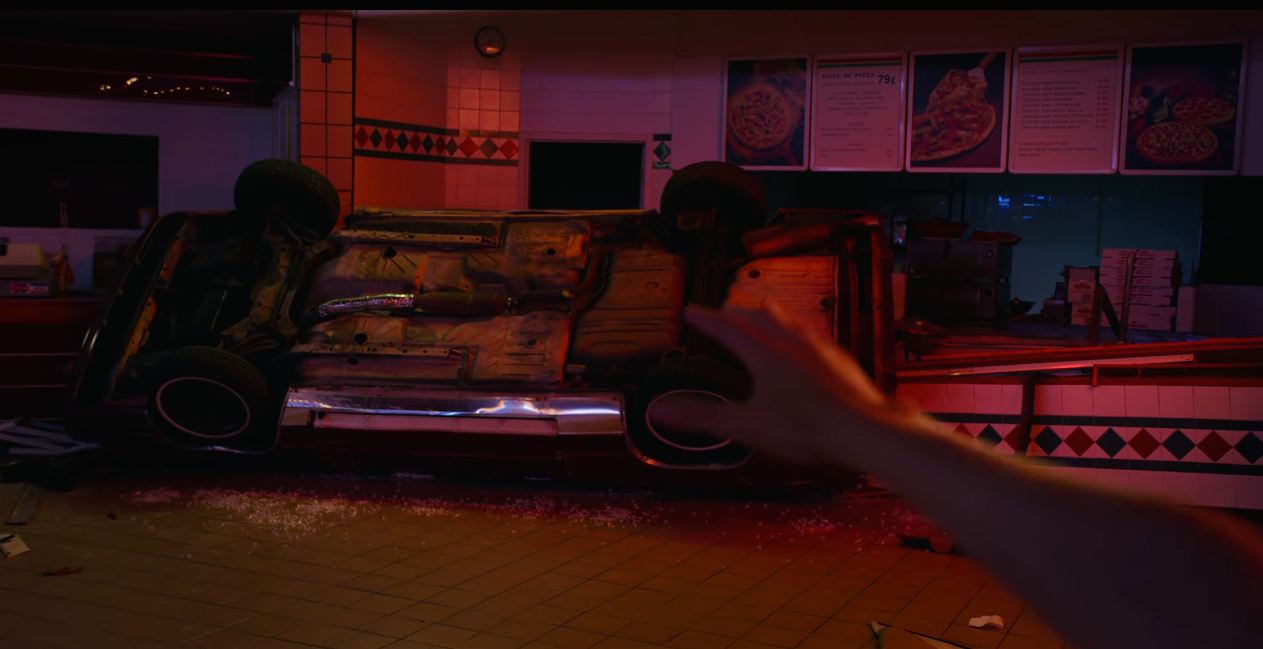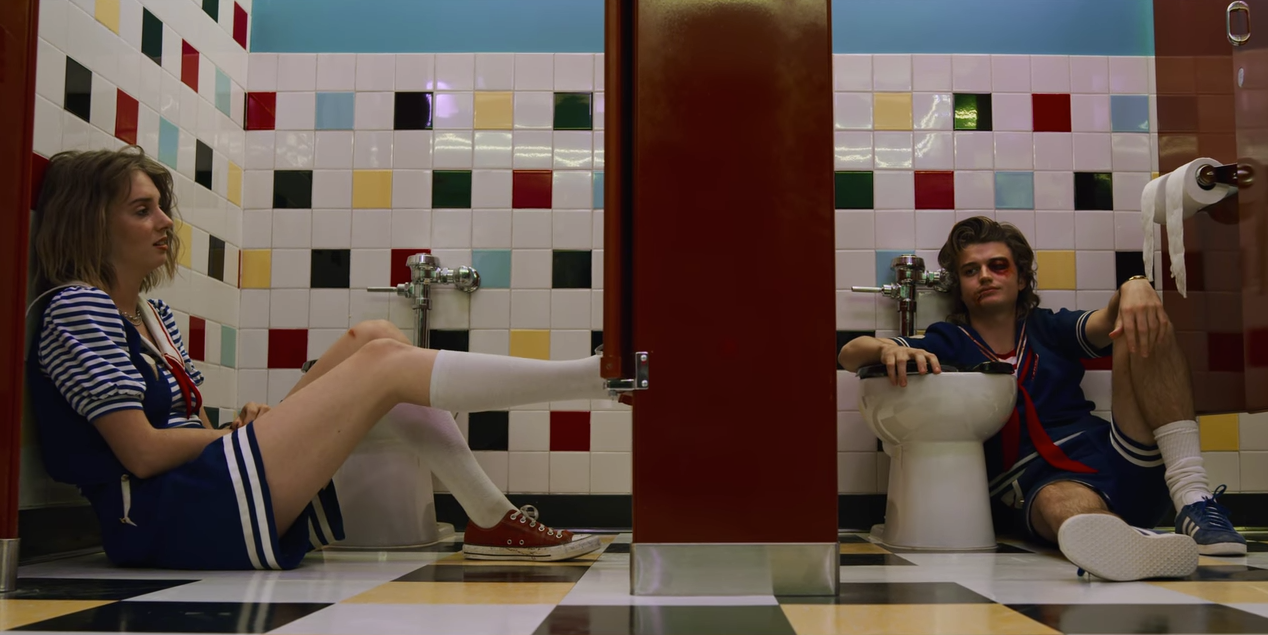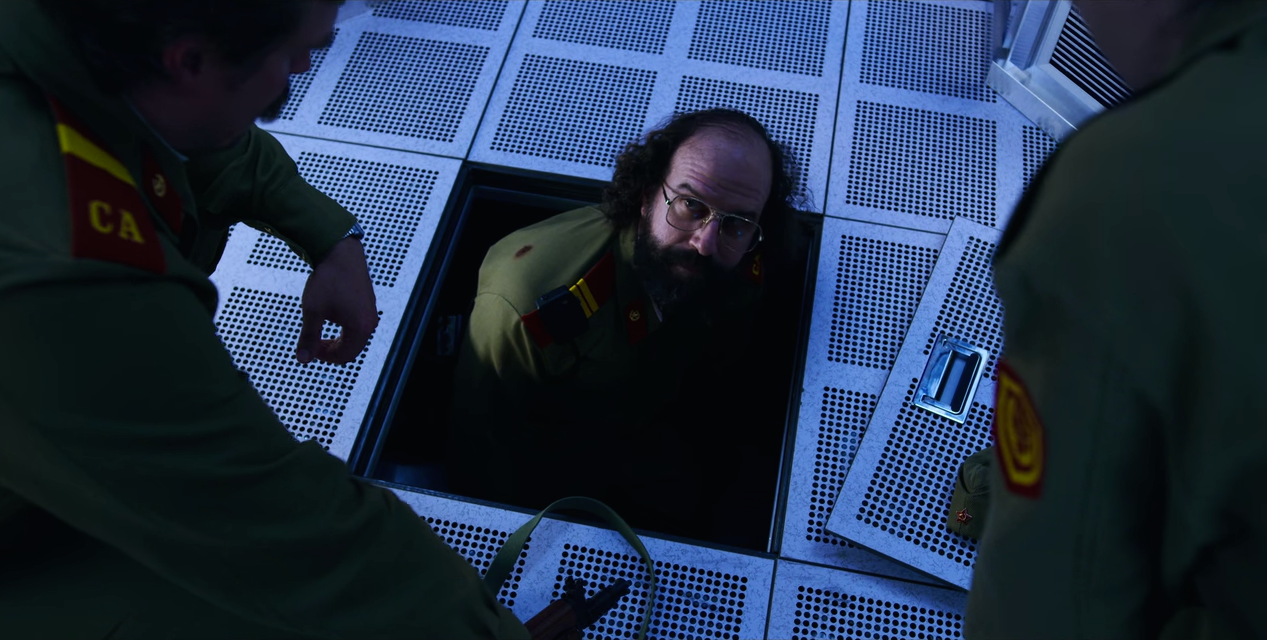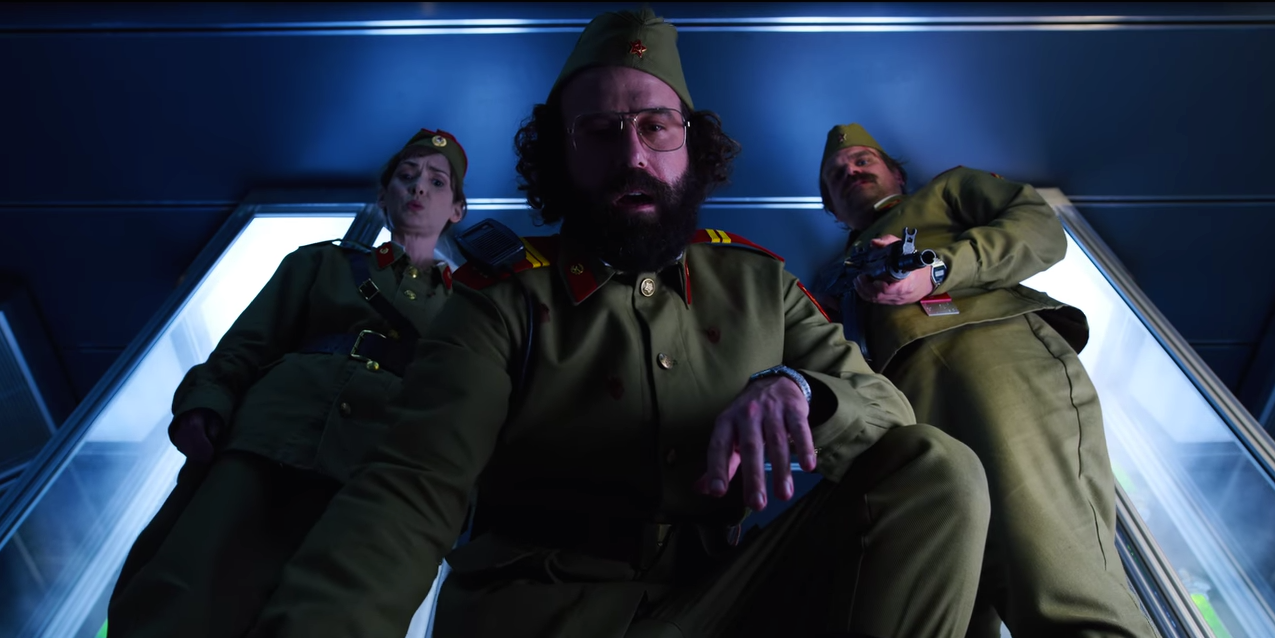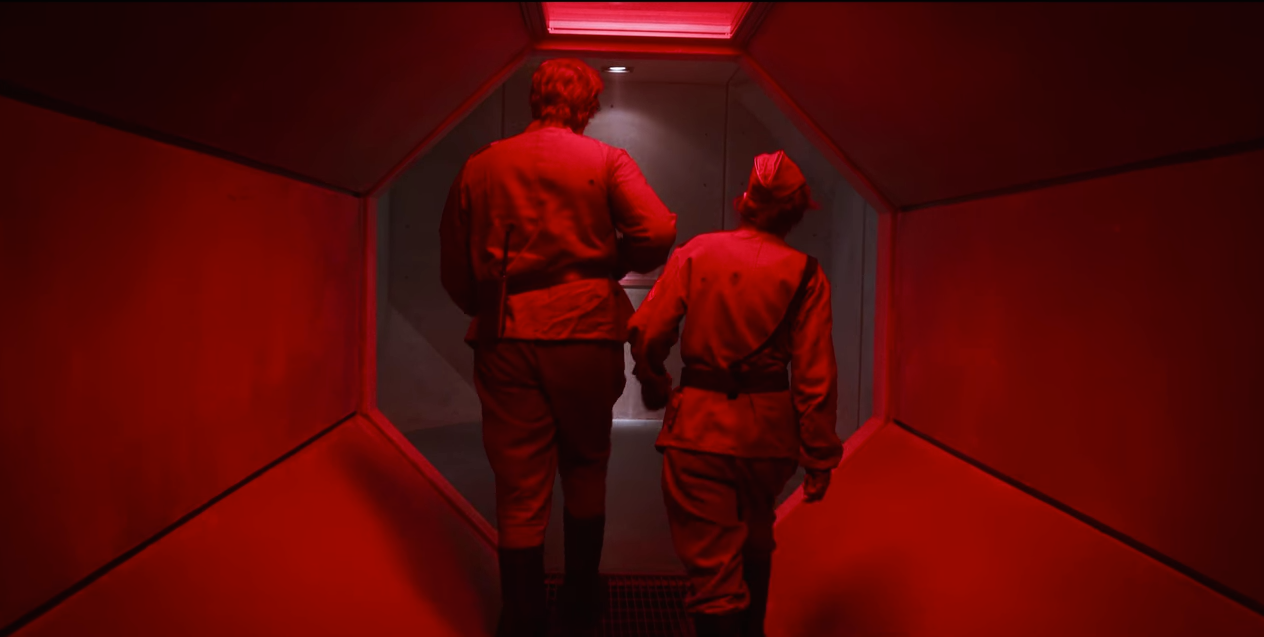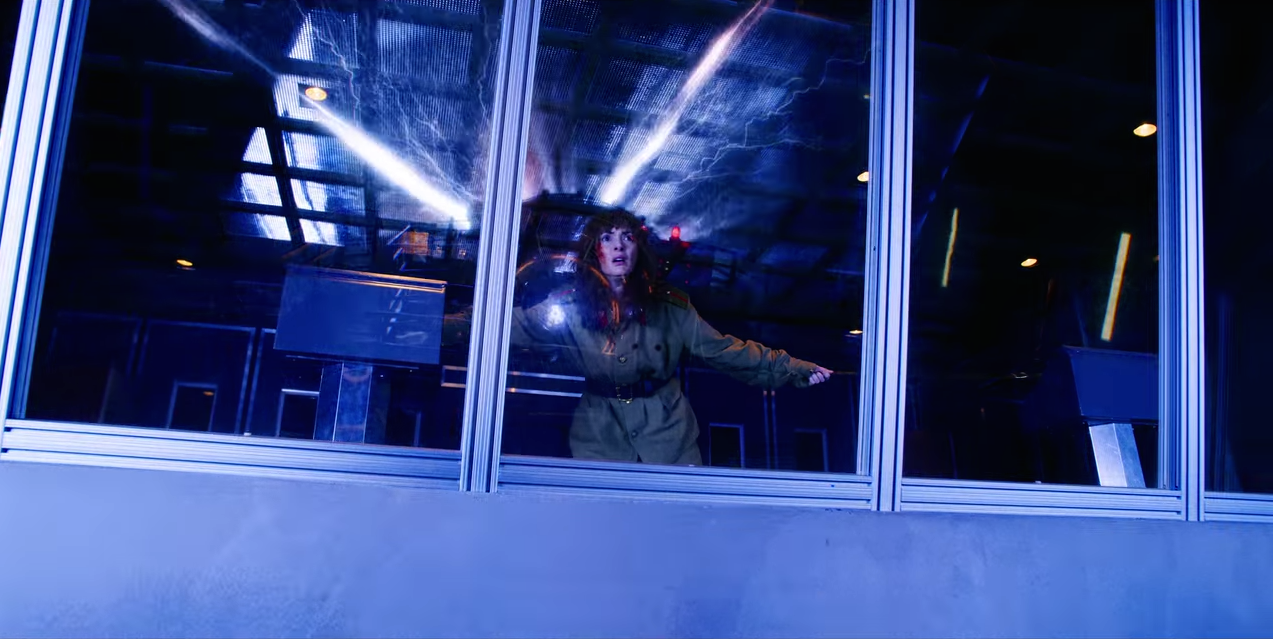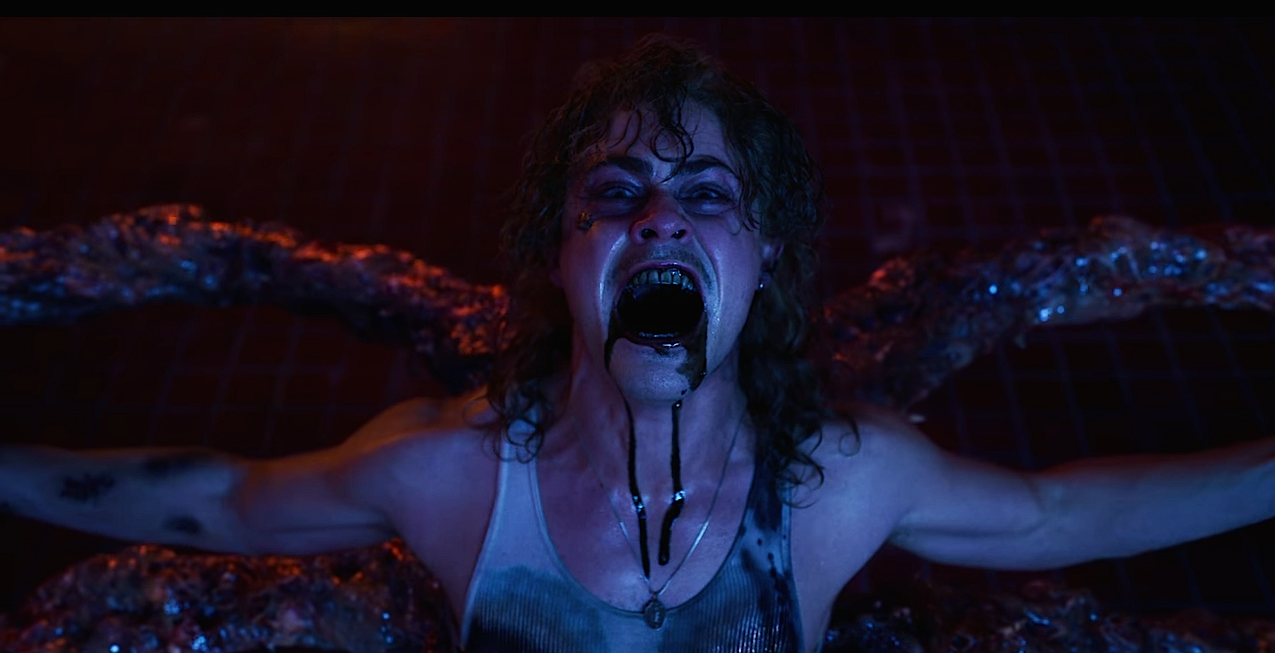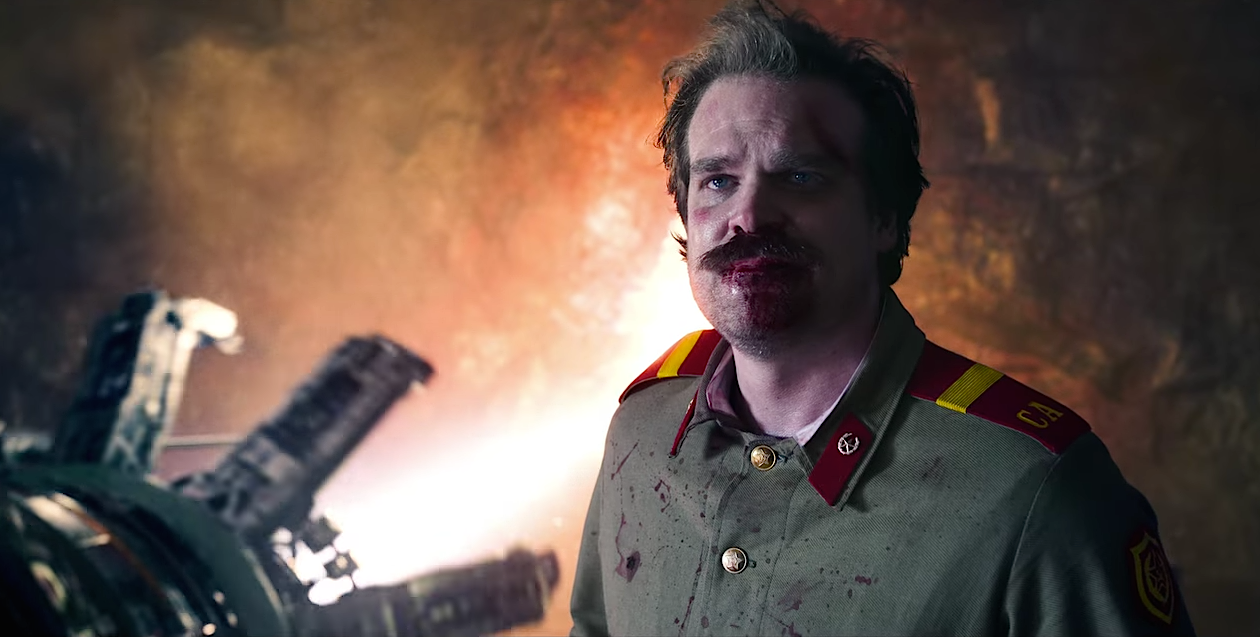In a stirring finale, Stranger Things stands up and grows up
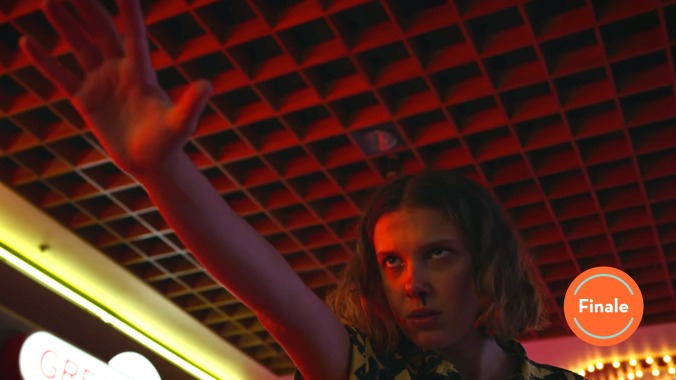

I admire how seamlessly and thoroughly the set design and background decor of Stranger Things 3 integrates the grid motif that was the hallmark of season one and continued in season two. It’s everywhere, but nowhere is it as pervasive as Starcourt Mall.
In a shot from above, our heroes look like little figurines against the grid of the atrium’s tile floor. In the food court and in the research chamber far underground, El and her father stand tall under two very different dropped ceilings, each a honeycomb of coffered cubes. In the bright mall bathrooms, graphic squares of color cheer up the cube motif; in the back room of Scoops Ahoy, the square blue edging of the walls conjures up images of the Holodeck.
And—because this season more than any previous is about the familiar turned strange—everywhere, occasionally, the familiar grid pattern is punctuated with an octagon. The corridors of the labyrinthian military compound, the many towers of eight-sides glass cabinets cutting the rooms into cubbies, the interior of the fountain in the mall’s food court. If some of the narrative’s angles are off—a little too winking, a little too glib—the overall pattern is true to the original, and a little bit more. It’s a bit more complex, with a few new angles introduced, a few more side stories, a broader range of references for the series and responsibility for the characters.
And Stranger Things has kept its sense of humor—about itself, about its characters. A standout scene in the previous episode was the fast-paced catch-up as character babble about their discoveries and bring each other up to speed. There’s a nice reprise of that in “The Battle Of Starcourt,” when Steve sums up the big picture, “just to be clear”: “This big fleshy spider thing that hurt El, it’s some kind of weapon?” he recites back. ”But instead of, like, screws and metal, the Mind Flayer made its weapon with melted people?” (Repeating her impatient “Yes!,” Nancy gives off strong ex energy.) Bless you, Steve Harrington, you exposition-excuse in a pompadour.
Everything after Murray Bauman’s loud, yoo-hooing entrance has the angles and the energy of a classic action flick, with no winking. Murray traces their path on the (admirably clear) schematics they extracted from Alexei while he and Jim Hopper confer confidently, all hairy chins and solemn squints. It’s a beautifully constructed scene, the food court’s neon signs adding a lurid cast to the everyday surroundings, thrumming score in the background keeping time as seconds tick away, every actor simmering with mingled determination, desperation, and half-formed plans. And fear. Everywhere, submerged, there’s fear.
Fear for themselves, but that’s not predominant. If it were, Hopper and Bauman wouldn’t be planning their infiltration of a secret Soviet lab. Dustin wouldn’t be volunteering to join them. No one would be doing anything but cowering in terror. They’re afraid for themselves, but they’re more afraid for this world. And these two grizzled men are going to save the day.
Then Erica, the upstart, the agitator, the experienced, breaks in. “What, you’re just going to waltz in there like it’s Commie Disneyland or something?” The cut to Lucas’ expression when she chimes in “I’ve been down in that shithole for 24 hours and, with all due respect, you do what this man tells you, you’re all gonna die.”
Dustin agrees, taking over Bauman’s map. “It’s a bit of a maze down there,” he says with airy confidence, “but between me and Erica, we can show you the way.” Seeing Hopper’s face, he adds, “Don’t worry, you can do all the fighting and the dangerous hero shit. We’ll just be your… navigators.”
It’s a smart plan. It’s the only plan. And Dustin lays it out with such assurance, such confidence in its obvious practicality, that I genuinely believed for one beat that the grown-ups would agree, even though I am a grown-up.
But Hopper puts his foot down, and everything stops when he does: the scene, the music, the action-movie fun, just for a minute. “No,” he says seriously, then jovially. “No.” He’s not taking children into an underground Soviet lab on U.S. soil, no matter how helpful their intel. Hopper isn’t just a grown-up, isn’t just a lawman, isn’t just a man responsible for the good of his town. He’s a parent. And he’s trying to be a good parent.
“The Battle Of Starcourt” is an answer to the unasked question of “Chapter Five: The Flayed,” when Lucas looks around the rag-tag group of kids in Hopper’s cabin, their parents useless or unreachable, and speaks the truth, the fear that comes into every young adult’s life one day when an emergency arises. “They’re not here,” Lucas says. “It’s up to us.”
The unasked question is this: Am I allowed to be a child? Am I, a teenager so often straining against the restrictive rules adults impose on me, am I allowed still to seek their protection and their comfort?
The answer, if the adults in a child’s life are trustworthy, is… sometimes. The answer is whenever possible. The answer is we will do our best to keep you safe. We will plan and back-up plan and double-check; we will do research and work hard and try to keep calm, even smiling, in the face of danger, because we want to you be safe and we want you to feel safe. The answer is if I can make you safe, you will be safe.
The answer is I hope so.
And the answer, I’m sorry to tell you, is also no. No matter how hard adults (parents or not) work to keep children safe (and to let teens be children for a little bit longer), we cannot protect you from the unknown, or even the mundane, forever. One day, you will have to be the adult, because there will be no one else to step into that role. Nancy, tucking up her hair as she wheels the station wagon out, brightly reminding everyone “seat belts!,” knows that.
Sometimes, there is no grown-up to take care of the danger. Sometimes, there is no supernatural superhero, no odd, sweet girl with near-omnipotent powers to fend off the foe. Sometimes, it’s just you and your friends and, if you’re lucky, you can use your smarts and your skills as leverage.
It’s awful watching El, her resources drained, trying to budge that New Coke can. It’s also a relief, at least to me, that El will not have to be the last bulwark between this world and destruction yet again. She has done so much, been relied upon too many times for too many tasks, and it is time for El to rest. It is time for someone to save El. It is time for the grown-ups to do what they have to do.
You could read this as a metaphor for almost any current American atrocity. Or you could read it as the bare minimum standard for acting like an adult: If you can protect children—living, breathing children with names and hobbies and hopes and dreams—you do it.
Even Billy understands this, deep down. Billy knocking out Max, then Mike, feels for a split second like a cruelly effective shortcut to get them out of a coming fight scene. Seeing him knock out El with the same ease is a brutal shock. But it’s a necessary reminder that, however powerful she is when “recharged,” right now, she’s as vulnerable in her way as any of her peers.
This is as good a place as any to insert Hopper’s scrawled words to El, the “heart to heart” he never got to give her. This is what Hopper writes after he stops mouthing his way through Joyce’s words about boundaries and safe spaces, and this is what Jim Harbour narrates uncomfortably, comfortingly, over much of the epilogue’s end:
“I know you’re getting older. Growing. Changing. And I guess if I’m being really honest, that’s what scares me. I don’t want things to change. So I think maybe that’s why I came in here. To stop that change. To turn back the clock. To make things go back to how they were.
But I know that’s naive. That’s just not how life works. It’s moving, always moving, whether you like it or not. And yeah, sometimes that’s painful. Sometimes it’s sad. And sometimes it’s surprising. Happy.
You know what? Keep on growing up, kid, don’t let me stop you. Make mistakes, learn from ‘em, and when life hurts you—because it will (echoing Karen here)—remember the hurt. The hurt is good. It means you’re out of that cave.
But please, if you don’t mind, for the sake of your poor old Dad, keep the door open three inches.”
Throughout these reviews, I’ve been calling the protagonists, this big band of scrappy champions, “heroes.” I wondered occasionally if I was overusing that word. Then “The Battle Of Starcourt” reprised a song from season one, their success transforming Peter Gabriel’s stark “Heroes” from cutting (as it was in “Holly, Jolly”) to triumphal. They stood up against evil that sought to take over their world, because someone had to. They’re heroes.
A lost little girl, cruelly crafted into a weapon by monsters who mistreated her. A broke, stressed-out single mom who stretches her tiny frame to do the work of a “two-man job.” A little boy with prickles on the back of his neck and fear in his heart. A pearl-smiled science nerd, a strategic thinker with the heart of a hero, the new kid in town with the fast skateboard and the triage skills to dress a wound in the field. A washed-up reporter with a little bit of Russian and a lot of moxie. A beaten little boy who learns, at the very last, to turn his rage against those who would harm the vulnerable. A loose-cannon drunk with a beer belly, a sad history, a bad sense of boundaries, and a greater love for his daughter than for himself can be a hero. They can be heroes.
Anyone can be a hero. They did it. And so can you, when you stand up against the wrongs you see around you, and when you grow up enough to put aside your own pain and take care of the vulnerable. We can be heroes, just for one day.
Stray observations
- Structurally, I understand why the Neverending Story scene couldn’t be a post-credits scene, but it broke the tension with merciless speed. Maybe that’s a feature, not a bug, for the series’ most sensitive viewers?
- The rule in horror is that no character is out of play until you see them dead, and sometimes not even then. I still crowed in delight and joy and even surprise when the post-epilogue stinger rolled, with mention of “the American” held in a prison somewhere deep under Kamchatka. I hope they make it to Enzo’s someday.
- The gate in that underground chamber is just a gussied-up, sleeked down version of the zombie gate in Day Of The Dead.
- Dustin and Lucas’ courtly presentation to Erica of Will’s old D&D manuals promises she’ll be more integral to any future outings, I hope.
- That’s it for Stranger Things 3 episodic coverage! There’s so much more to say and to speculate on, so have at it in the comments, and thank you for joining me.
